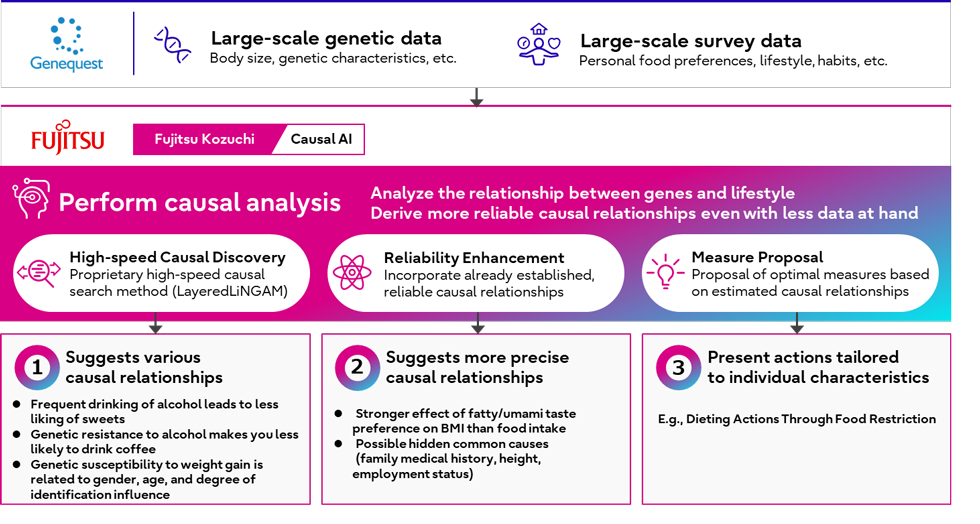
Tokyo and Kawasaki, Japan, October 9, 2025 - (JCN Newswire) - Genequest Inc. and Fujitsu Limited today announced the discovery of new insights into the causal relationships between genetics and lifestyle. The research utilized causal AI, a core technology of Fujitsu's AI service Fujitsu Kozuchi.
Causal AI consists of three main functions: high-speed causal discovery, which estimates the causal relationships between data approximately 1,000x faster than conventional technologies (1) reliability enhancement, which enhances data with the inclusion of established causal knowledge (e.g., expert knowledge and past experimental results) and measure proposal which not only visualizes causal relationships through conventional analysis but also proposes optimal measures.
By utilizing causal AI, the parties derived a multi-faceted causal structure regarding not only individual correlations but also the relationship between preference for sweet foods, coffee and alcohol consumption frequency, and their associated genetic traits, as well as the impact of genetic factors on body mass index (BMI). Additionally, by repurposing the Hirosaki Health Checkup Causal Network Model (2), developed by Kyoto University and Hirosaki University in collaboration with the latter’s Iwaki Health Promotion Project COI-NEXT, and applying it to the reliability enhancement function, the research was able to suggest more precise causal relationships between lifestyle habits, health, and background factors. The utilization of the Hirosaki Health Checkup Causal Network Model was made possible through the collaborative research course Large Scale Medical AI (Fujitsu Research Lab.) (3) by Kyoto University and Fujitsu.
Based on these estimated causal relationships, it is hoped that the measure proposal function will be able to suggest individually optimized health measures tailored to personal food preferences, lifestyle habits, physique, and genetic characteristics.
Moving forward, Genequest will continue to advance multi-faceted research by combining questionnaires, health checkups, and medical information and aims to contribute to the exploration of personalized health promotion and disease prevention approaches.
Fujitsu's causal AI is a powerful tool for extracting new insights from complex data and supporting decision-making across a wide range of fields, not limited to medical and genetic domains. Fujitsu will accelerate its efforts to solve challenges and create new value in various industries.
Yasushi Okuno, Professor, Graduate School of Medicine, Kyoto University comments:
"The onset of diseases is deeply intertwined with genetic function and living environment. However, the relationship between these two factors and disease onset is complex, and many aspects remain unknown. This initiative is an important step towards elucidating objective causes of disease based on data and deepening our understanding of disease onset. We have high expectations that this will contribute to the realization of personalized preventive measures and effective approaches."
Koichi Murashita, Vice-President, Professor Vice-Director, Institute of Global Well-being Science Director-General, Research Institute of Health Innovation Hirosaki University comments:
“At Hirosaki University COI-NEXT, we are working to further strengthen the research and social value of our comprehensive real-world data platform, centered on the multi-dimensional health big data (3,000 items) accumulated through the Iwaki Health Promotion Project health checkups, and to create true social innovation. We are very pleased that the research results utilizing our big data have merged with cutting-edge technology to create new knowledge. We have high expectations that these results will contribute to the development of preventive medicine and the improvement of global well-being."

Figure: Overview of the research
Research Overview
With advancements in genome science, many correlations between genes and physical constitution/behavior have been reported. However, delving deeper into causal relationships—what causes what, and through what mechanisms effects occur—has been challenging as it requires considering the influence of multiple factors. Particularly in areas involving complex elements such as food preferences, lifestyle habits, and physique, precise data analysis is required.
In this research, Genequest's extensive genetic and questionnaire data were combined with Fujitsu's causal AI, utilizing Fujitsu's high-speed causal discovery function to analyze these complex causal mechanisms more deeply. This demonstrated the ability to precisely analyze hidden factors within complex relationships and the interactions between various factors, contributing to the creation of new value.
Results
In this research, causal analysis was conducted primarily in the following two areas, using genetic data and questionnaire data from approximately 4,000 consenting individuals, and leveraging the reliability enhancement function and measure proposal functions provided by Fujitsu's causal AI.
1. Relationship between genetic traits related to alcohol metabolism and eating habits
While genetic factors were previously suggested to influence a preference for sweet foods and coffee intake, analysis using causal AI revealed that the association is likely mediated primarily by drinking frequency, rather than solely by genetic alcohol tolerance. Furthermore, for coffee consumption frequency, no direct link to drinking frequency was observed, suggesting that genetic alcohol tolerance may be an influencing factor. This highlights the potential impact of specific genetic traits on an individual's beverage choices.
2. Relationship between genetic traits related to physique, eating habits, and BMI
Using polygenic scores, an index integrating numerous genetic factors related to BMI, the causal relationship between genetic predisposition to obesity, eating habits, and BMI was analyzed. The results suggested a direct association between genetic predisposition to obesity and BMI, with its statistical impact being comparable to that of sex and age. Slight associations were also observed with food preferences such as for fatty and sweet foods.
Particularly, in the analysis utilizing the reliability enhancement function by repurposing the Hirosaki Health Checkup Causal Network Model, more precise results were obtained. The influence of meal quantity, previously suggested as a major factor in BMI change after polygenic scores in earlier analyses, decreased relatively, while preferences for fatty and umami tastes were suggested as more influential factors. Furthermore, factors previously outside the scope of analysis, such as family medical history (cancer, hypertension, heart disease, etc.), the subject's height, and employment status, were suggested as potential hidden common causes between variables.
In addition, the research results imply that the causal AI measure proposal function could be utilized to present concrete actions for achieving individual goals (e.g., BMI reduction, improvement of specific eating habits) based on causal relationships, considering individual characteristics.
(1) Fujitsu's proprietary high-speed causal discovery method:
H. Suzuki, LayeredLiNGAM: A Practical and Fast Method for Learning a Linear Non-gaussian Structural Equation Model (ECML PKDD 2024)
(2) Hirosaki Health Checkup Causal Network Model:
A highly reliable causal network constructed by Kyoto University's research group applying its unique Bayesian network technology to the multi-dimensional health big data obtained from the Iwaki Health Promotion Project health checkups by Hirosaki University COI-NEXT.
(3) Collaborative research course Large Scale Medical AI (Fujitsu Research Lab.):
Conducts research and development of new AI technologies to solve challenges in the health and medical fields. This is one of Fujitsu's Fujitsu Small Research Lab initiatives, where Fujitsu researchers are stationed at universities in Japan and overseas to engage in industry-academia collaboration activities.
About Genequest
Founded in 2014, Genequest was the first company in Japan to offer large-scale genetic testing services directly to consumers. The service provided over 350 genetic items related to disease risks and physical traits, enabling users to check genes associated with various conditions and characteristics. With a vision to advance genetic research, promote the responsible use of genetic information, and enrich people’s lives, Genequest actively conducts research utilizing its accumulated genomic data.
Official website: https://genequest.jp/forbiz/en
About Fujitsu
Fujitsu’s purpose is to make the world more sustainable by building trust in society through innovation. As the digital transformation partner of choice for customers around the globe, our 113,000 employees work to resolve some of the greatest challenges facing humanity. Our range of services and solutions draw on five key technologies: AI, Computing, Networks, Data & Security, and Converging Technologies, which we bring together to deliver sustainability transformation. Fujitsu Limited (TSE:6702) reported consolidated revenues of 3.6 trillion yen (US$23 billion) for the fiscal year ended March 31, 2025 and remains the top digital services company in Japan by market share. Find out more: global.fujitsu
Press Contacts
Genequest Inc.
https://genequest.jp/contact/
Fujitsu Limited
Public and Investor Relations Division
Inquiries